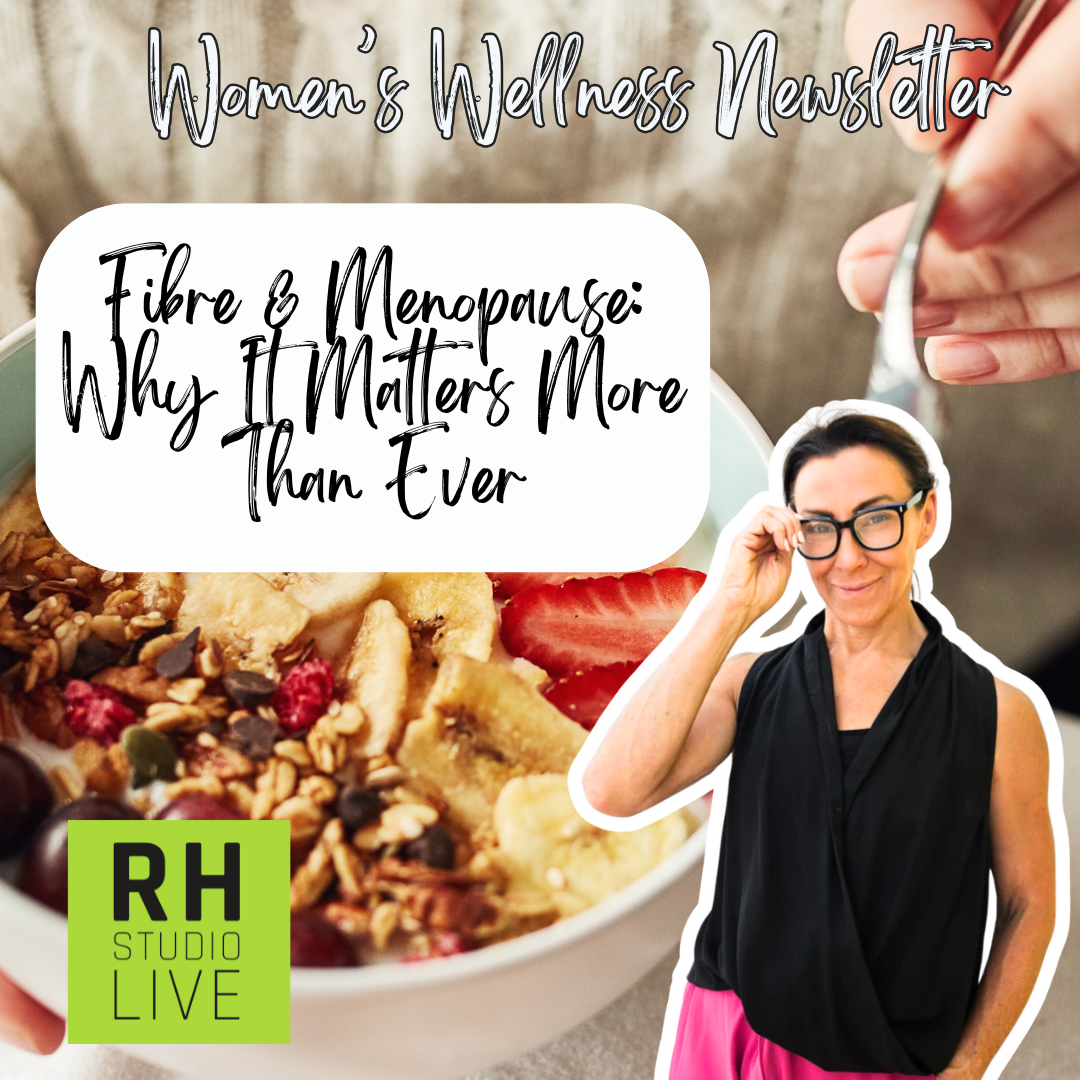Welcome to my weekly Women’s Wellness Newsletter, which I send out every Saturday. This space is for women of all ages who want to live well, feel vibrant, and stay strong.
Each week, I’ll share simple, practical tips to help you manage your wellness and introduce habits you can apply immediately to feel better, energised, and empowered.
Can You Really ‘Balance’ Your Hormones Through Nutrition and Lifestyle?
The phrase ‘balancing your hormones’ is everywhere these days, especially in the wellness and fitness space. But the reality is a bit more complex. Our hormones naturally fluctuate throughout life—in response to age, monthly cycles, stress, sleep, illness, and, for women, significant transitions such as perimenopause and menopause. There is no magic switch to keep hormones at one perfect ‘balanced’ level.
What Nutrition and Lifestyle Can Actually Do
Rather than aiming for a fixed balance, the goal is to optimise hormonal health—helping your body function as smoothly as possible through all its natural rhythms and changes.
Good nutrition and a healthy lifestyle can help you:
- Stabilise blood sugar levels, reducing mood swings, cravings, and energy crashes.
- Lower inflammation, supporting everything from joint health to the immune system.
- Improve gut health, which influences how hormones like oestrogen are processed and eliminated.
- Promote better sleep, which is essential for healthy hormone production and recovery.
- Manage stress, since chronic stress can disrupt hormones like cortisol and impact sleep, appetite, and can even lead to long term health conditions.
- Maintain a healthy weight, as body fat can influence levels of hormones like oestrogen and insulin.
The Menopause Factor
During perimenopause and menopause, the picture shifts even more. At this stage, the ovaries naturally reduce the production of hormones such as oestrogen and progesterone. This decline is normal and is what brings about the end of menstrual periods and many of the common menopause symptoms (like hot flushes, night sweats, sleep disturbances, and changes in mood or memory).
Here’s the important point:
No diet, supplement, or ‘natural’ lifestyle intervention can reverse this decline or raise your hormone levels back to pre-menopausal levels. Nutrition and lifestyle can help you manage symptoms, support your overall health, and improve quality of life during menopause—but they can’t ‘top up’ your hormone levels.
The Role of HRT (Hormone Replacement Therapy)
The only proven way to increase or ‘replace’ oestrogen and progesterone after menopause is through Hormone Replacement Therapy (HRT). HRT is prescribed to supplement the body’s reduced hormones, and can be extremely effective at alleviating menopause symptoms, protecting bone health, and supporting long-term wellbeing for many women.
Nutrition and lifestyle will always be VITAL:
They play a vital supporting role—helping with weight management, bone strength, heart health, mental wellbeing, and overall energy. However, if someone is experiencing significant symptoms related to low oestrogen or progesterone, and wants to actually increase these hormones, HRT is the only way to do this.
In Summary
- Nutrition and lifestyle are powerful tools for supporting your hormones and managing symptoms, especially during big transitions like menopause.
- You cannot ‘top up’ or replace lost hormones through food or supplements alone.
- HRT is the only way to replenish hormone levels that have declined due to menopause.
- Combining a healthy lifestyle with, if appropriate, medical options like HRT gives you the best support for body and mind as you move through menopause and beyond.
If You’re Taking Weight Loss Medications Like GLP-1, Is a Healthy Lifestyle Still Important?
There’s been a surge in the use of GLP-1 medications for weight loss, including well-known names like Ozempic, Wegovy, and Mounjaro. These medications can be very effective for helping people lose weight, but they are not a magic solution on their own. Maintaining a healthy lifestyle—especially when it comes to exercise and nutrition—remains absolutely essential.
Here’s why:
1. Preserving Muscle and Bone Health
GLP-1 medications often lead to rapid weight loss, which can include a loss of muscle as well as fat. Regular strength training and physical activity help preserve muscle mass, support metabolism, and protect bone density—especially important as we age and particularly for women after menopause.
2. Supporting Long-Term Weight Maintenance
Studies show that people who combine medication with healthy eating and regular exercise are more likely to maintain weight loss in the long run. Healthy habits make it easier to keep the weight off once you stop taking the medication, reducing the risk of weight regain.
3. Improving Metabolic Health
Exercise and a nutritious diet support heart health, stabilise blood sugar levels, reduce inflammation, and improve cholesterol—all risk factors for conditions like heart disease, type 2 diabetes, and metabolic syndrome. Medications alone can’t provide all these protective effects.
4. Enhancing Mental Wellbeing
Physical activity, social connection, and balanced nutrition all support better mood, sleep, confidence, and overall quality of life. These benefits go beyond the number on the scales and can help improve your day-to-day wellbeing.
5. Teaching Lifelong Healthy Habits
Medications like GLP-1 are often used as part of a comprehensive approach that includes support from healthcare professionals, nutrition education, and coaching around healthy habits. The goal is to equip you with skills and routines that last well beyond any period of medication use.
What Does This Mean in Practice?
- Eat a varied, balanced diet: Prioritise lean proteins, plenty of vegetables, whole grains, healthy fats, and fibre. This will help maintain muscle and prevent nutritional deficiencies as you lose weight.
- Move your body regularly: Include a mix of strength training, aerobic exercise, and activities you enjoy.
- Stay connected: Join classes, walking groups, or online communities for motivation and support.
- Monitor progress: Regular check-ins with a healthcare provider or fitness professional help keep you on track and adjust your plan as your needs change.
In summary:
GLP-1 medications can be a useful tool for weight loss, but they are most effective—and safest—when combined with a healthy lifestyle. Nutrition and exercise support every aspect of your physical and mental wellbeing, both during weight loss and for long-term health. Building healthy habits now means you’ll have the tools to stay well, strong, and energised for life.
You’re eating well and exercising—why not take it to the next level? My Menofit™ 5-Day Midsection Meltdown programme is on offer today. It’s a step-by-step plan you can follow at home, with a daily talk and exercise session to keep you motivated.
I’ve included a shopping list and meal plan to make things simple, plus you’ll get 7 days’ access to all of my online classes—so you can really give it a go!
Join my 5 Day Menofit™ Midsection meltdown Quick Programme CLICK here for details



